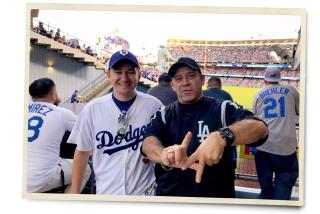Soviets Learn Language of Baseball
- Share via
Some men go to the Soviet Union to establish business relations, others to enhance diplomatic understanding. But there was Lou Frank detailing the infield fly rule and why it’s illegal to tag up and leave a base before the ball is caught. He was getting the message across with the help of an interpreter.
The book of baseball rules, especially the complex aspects, can be equated to a foreign language. It was literally that for Frank when he went to the Soviet Union to instruct classes in how to be an umpire. For 26 days, he talked, demonstrated and critiqued the work of the officials.
Although he was there to do the teaching, it became a learning experience for him, too. Surprisingly, he found the Soviets were acquainted with the accomplishments of Babe Ruth, Ted Williams, Stan Musial and Lou Gehrig, plus contemporary players.
“They even knew the major leagues had experienced a lockout because of labor contract problems and wanted to learn more about it,” he said. “There must have been a million toasts between us. That’s the Russian way. They were gracious, and the hospitality was superb.
“As loyal Americans, we emphasized we loved our country dearly. Then we mentioned if Russia ever defeated the United States in baseball that it would have the same feeling we knew when our Olympic ice hockey team defeated theirs in 1980. Another point we tried to make is that to understand the American mind you have to understand baseball.”
Frank, a retired vice president of the Hecht Co., has been an amateur umpire in the Baltimore area for 15 years. A nephew, who is an exchange student in the Soviet Union, is a friend of an American, one Richard Spooner, who is involved in Soviet baseball. Spooner provided the contact that brought Frank to the Soviet Union for the purpose of explaining umpiring techniques.
It wasn’t necessary to send umpires from organized baseball. Frank’s awareness of the fine points of umpiring so exceeded the limited knowledge of the Soviets that he was regarded as the second coming of Bill Klem and Jocko Conlan. They use four umpires for all games, lacking uniforms and standard equipment but officiating more by committee than individual decisions.
“We kept telling them how they had to be more assertive and to end those committee meetings,” explained Frank. “All the umpires had other jobs but most of the players were doing it full-time as a profession. They made around 350 to 400 rubles, which translates to around $40 to $50 a month on the exchange rate. The umpiring has a long way to go, but they are earnest and conscientious and I believe are going to improve.”
Phil Willen and Larry Silverman, two Baltimore businessmen, provided some of the funds for Frank’s trip. He took baseballs as gifts from the Orioles and reports that the Toronto Blue Jays bought a set of uniforms for one of the teams. “The players use gloves from Japan and Korea. Most of the balls came from Cuba and they complained about them. There’s only one true baseball field in all of Russia. That’s at Moscow State University and was built by a Japanese ambassador who loved baseball. It’s an artificial turf field, with a wire fence around it, a press box and locker rooms.”
Most of the games, however, are played on soccer fields, which means either right or left field is abnormally short. They pitch without the benefit of a mound and the throwing speed is remindful of American batting practice. Often the balls they use are scuffed from wear and black as a lump of coal.
Games were played in Simferopol and Eypretoria. Frank would observe and make suggestions as to the positioning of the umpires and how they went about making the calls. All the players used aluminum bats, and Frank quickly recognized Soviet baseball is a “hitter’s game.”
Disputes with umpires would last all of two seconds because it’s not in the Russian nature to argue and the players admitted they didn’t know enough about the rules to offer a challenge in the first place.
But one thing they did do when they were unhappy with a decision was to change their facial expressions to mirror disgust. So if looks could kill, some umpires would be stone-cold dead for calling a runner safe at the plate. But there are no vocal insults exchanged because in the Soviet Union, an umpire is afforded the same respect as a judge.
Leo Durocher and Earl Weaver would have had to change their ways.
More to Read
Go beyond the scoreboard
Get the latest on L.A.'s teams in the daily Sports Report newsletter.
You may occasionally receive promotional content from the Los Angeles Times.






